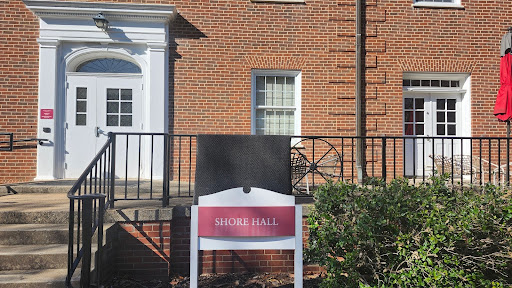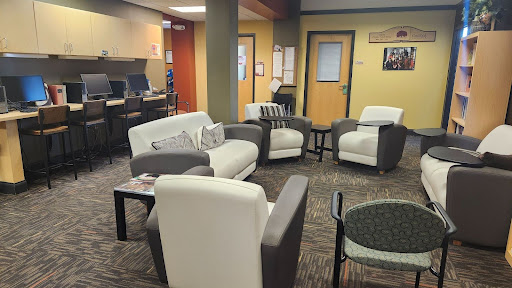Major changes could be on the way for Guilford’s First-Year Experience program. Members of the campus community have recently made two related proposals.
The first is to change FYE 101 to PPS 101, in order to more heavily emphasize Principled Problem Solving. The second proposal is to include more anti-racism content in the lab portion of the course, FYE 102.
Both proposals are designed to better achieve the original goal of FYE.
“One of the learning objectives is to look at a problem from different disciplines and consider the ethical implications,” said Barbara Boyette, assistant academic dean. “Changing the name to PPS would help clarify the content and purpose of the class.”
Mark Justad, director of the Center for Principled Problem Solving, submitted the proposal to change FYE 101 to PPS 101 in response to the Strategic Long Range Plan II. The proposal is designed to integrate more principled problem solving into the Guilford College education. It also includes proposed changes to the IDS requirement. The Curriculum Committee is currently considering the proposal.
Most FYE instructors interviewed suggest that the change should not be in name only.
“Changing the name is easy,” said Alan Mueller, assistant dean of career and community learning. “Changing the content of what you’re doing, the substance is a trickier question. I think adding a PPS component to what we already do is good.”
Will Pizio, associate professor of justice and policy studies, also sees this change as positive.
“In the last 20 years, there have been several iterations: name changes, prefix changes and focus changes, so this change is a pretty smart move,” said Pizio. “PPS is already in the Strategic Long Range Plan, so making it part of the First-Year Experience seems the next logical move. And to be honest, we do a lot of PPS in FYE already.”
Andy Strickler, dean of admission and financial aid, agrees.
“As PPS is a major initiative of SLRP II, I think aligning a major curriculum requirement with it would make great sense,” said Strickler. “As a Quaker institution, we are a bit different than almost all other small liberal arts colleges, and therefore each student should have a good idea as to who we are by the end of the first semester.”
This shift would also reflect many traditional Quaker values.
“Quaker educators have long been committed to teaching ‘things civil and useful,’ so engaging students with problem solving is part of our DNA as an educational institution,” said Jim Hood, professor of English and interim coordinator of FYE. “The college’s commitment to Principled Problem Solving as a key institutional focus makes sense of our educational heritage and provides a kind of learning that is very important in the world now.”
PPS 101 will be a pilot program next semester.
The second proposal made by students for change in the FYE program involves improving the diversity module in FYE 102. Sophomores Alexandra Haridopolos and Sara Minsky and senior Tim Leisman all worked over J-Term along with Jorge Zeballos, interim director for diversity training and development and Latino community program coordinator, to design a proposal for an addition to the 102 curriculum.
“We developed a three-day curriculum for the FYE lab course,” said Minsky, a community justice and economics double major. “The first day is spent developing a sense of community between students by reflecting upon their identity. The second is focused on looking at how discrimination is built into institutions, and the third is about what Guilford’s role is in combating oppression, and what resources are available on campus.”
Haridopolos, an English major and PPS scholar, explained why the group feels this proposal is an essential step.
“I feel it is important for first-year students to be introduced to these issues in their first semester at Guilford because anti-racism is built into the core value of equality,” said Haridopolos.
Leisman believes the program has never stagnated and should keep evolving.
“I feel that the program is always changing,” said Leisman. “It’s not that it’s important to create change because that’s going to happen regardless. It’s (important) to make the change in the right direction, to create sustainable structures that will serve students better in their experience at Guilford, and be ready to change to … better serve students.”
Since both proposals significantly change the content of the courses, time may be a major challenge for FYE programs in the future.
“I wish the FYE lab had more time than one hour per week,” said Mueller. “At other places I’ve taught, the course is two or two-and-a-half hours per week. It’s a lot easier to talk about diversity and building a community with more time.”
Hood explains the importance of continually improving the program.
“It only meets one hour and 15 minutes a week for 15 weeks, so it’s difficult to get everything accomplished. But thinking about what should be stressed in FYE 102 is a great exercise in figuring out what is really core to the Guilford experience, so I welcome a larger conversation about what should be included,” said Hood.
While the PPS proposal is being piloted next fall, the FYE 102 proposal is not at the same stage in its development. However, it has gone before campus organizations, including the Community Senate and the Diversity Action Committee.





